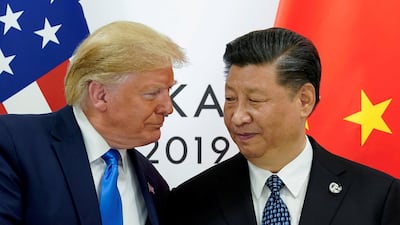A while ago I asked in these pages why China’s authorities were not better at setting out a positive case for the contributions they had helped make to other countries around the world – because they are in fact legion, but detractors who want to accuse Beijing of practicing debt-trap diplomacy, for instance, will never mention them.
It may seem counter-intuitive, or even perverse, in the age of US President Donald Trump, but why is America not better at promoting itself abroad? This is something that needs to be raised in an era which is characterised not just by actual contestation with China, but by a culture on the hawkish right that borders on encouraging conflict or that suggests, in a possibly dangerously self-fulfilling way, that it is inevitable.
Everything is seen through the lens of competition. Take a report by Australia’s Lowy Institute last November which stated that China now had more missions, consulates and other representative offices around the world than the US. That prompted the headline in one publication: “The US is losing its crown to China as the world’s biggest diplomatic power”. Given that foreign service heft is measured not solely by the numbers of diplomats or embassies, that conclusion is debatable. What is not, however, is that China is getting a much better return on the money it spends abroad than the US.
Until Mr Trump announced he would stop funding for the World Health Organisation (WHO), the US had been the largest annual contributor, in the hundreds of millions per year. China contributes around a tenth of the American total. But when President Xi Jinping pledged an additional $30 million to the WHO a week after Mr Trump’s intervention he garnered plenty of favourable media coverage, for what was a minuscule amount by comparison.
As the Atlantic magazine put it recently: for years, US officials have been "worried that China kept somehow buying more influence, with less money, around the world." In the UN system in general, writes the French academic and analyst Francois Godement, while the US provides far more financial support than China, it appears that "the US talks loudly but carries a small stick" whereas "China now speaks softly but carries a big stick."
The UN has its own special dynamics; China’s ability to cast itself still as a fellow developing country and to “say no” at the Security Council as Mr Godement rightly points out, constitutes a power unquantifiable in monetary terms. But the broader point remains.
The lack of wider knowledge about what America's presence means struck me forcefully when looking at the US State Department's document on "A Free and Open Indo-Pacific" that I mentioned last week. Let some of the figures sink in: "In 2018, we conducted over $1.9 trillion in two-way trade with the region, supporting more than three million jobs in the US and 5.1 million jobs in the Indo-Pacific. All five of our non-Nato bilateral defence alliances are in the Indo-Pacific. We are also the largest donor of foreign assistance in the region, contributing $2tn in constant dollars since the end of the Second World War."
There is much, much more. But rarely are these sums spelt out so specifically. As one Malaysian analyst put it to me: “The Americans, including the private sector, have been here in Asia for ages. But they seem unable to harness that narrative and sell it like China does.”
Could Mr Trump perhaps have a point when he berates the rest of the world for being ungrateful to America? Have we all got used to taking US largesse for granted?
Now of course there are all sorts of reasons why some people or countries are not so fond of Uncle Sam. An overly interventionist foreign policy backed by a self-awarded exceptionalism that has allowed president after president to act extra-judicially or order disastrous invasions. There is a reflex anti-Americanism on much of the left; not just among those who granted too much benefit of the doubt to Communist regimes during the Cold War, but also those who dislike the inequalities resulting from the unbridled capitalism Washington champions.
Many would argue that lots of US spending overseas is not altruistic but is about upholding its “leader of the world” status. That is at least partly true; USAID, the agency which administers around half of American assistance abroad, is explicit that it is an instrument of US foreign policy.
But the figures speak for themselves – that is, when they are actually mentioned. Where would Nato have been without the US’s overwhelming defence spending? How would Europe have coped without the multibillion US Marshall Plan that helped the continent recover after the devastation of the Second World War?

What would happen to the security of Southeast Asian countries in the South China Sea if the US didn't conduct freedom of navigation operations? It is virtually risk-free for regional politicians to use anti-colonial rhetoric to win votes, but they would be terrified if US forces departed for good. And that $2tn in foreign assistance to the Indo-Pacific bears repeating.
Yes, US funds and support often come with a price tag. American officials have a long and tiresome habit of wagging their fingers at developing countries that dare to have different cultural, legal and political systems. But fears or resentments about US imperial overreach should not obscure all the good America has done in the real business of nation-building: in education, training, skills transference, infrastructure and investment.
This is no paean to America. Nor do many countries want to be placed in the invidious position of having to choose between the US and China. But perhaps when measuring up the assistance Beijing and Washington are offering, it is worth remembering that the answer to the question “just what did the Americans do for us?” is “actually, rather a lot.”
Sholto Byrnes is a commentator and consultant in Kuala Lumpur and a corresponding fellow of the Erasmus Forum



